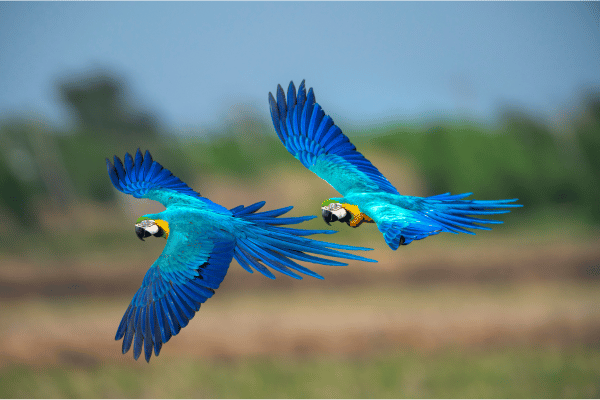Embarking on the journey of buying a macaw opens a world of colorful companionship. These magnificent birds offer more than beauty; they bring lively interaction into your life. This guide will navigate you through the essentials of choosing your feathered friend wisely.
Understanding Macaw Needs and Behavior

Choosing a macaw involves more than admiration. These birds, known for their striking colors and intelligence, require a dedicated owner. Their care demands time, space, and mental stimulation. Before buying a macaw, consider if your lifestyle can accommodate these needs.
Buying a macaw isn’t a decision to take lightly. These parrots need a varied diet, including fruits, nuts, and specialized pellets. Their social nature demands interaction. Without it, they may develop behavioral issues. Ensure you’re ready for this commitment.
The joy of a macaw comes with responsibilities. Regular veterinary check-ups are essential. Their long lifespan means a commitment of several decades. Before buying, research and prepare your home for this vibrant addition.
Creating the Perfect Habitat for Your Macaw
Building a suitable home for a macaw starts with space. These large birds flourish in environments where they can fly and explore. Consider a spacious cage or aviary, ensuring it’s secure and safe from hazards. Ample space prevents stress and promotes health.
Beyond space, the location of your macaw’s habitat is pivotal. It should be away from drafts but in a lively area of your home. This allows for social interaction, crucial for their well-being. Prioritize a spot that blends tranquility with family engagement.
Enriching your macaw’s habitat with toys and perches fosters a stimulating environment. Rotate these items regularly to keep your feathered friend engaged and curious. Natural wood perches of varying sizes encourage healthy foot exercise, preventing arthritis and other issues.
Buying a Macaw: Knowing Health and Diet

Health awareness is key when buying a macaw. These birds can hide illnesses well, so keen observation and regular vet visits are essential. Look for signs of vitality like bright eyes, clean feathers, and active behavior as indicators of good health.
A balanced diet is the cornerstone of a macaw’s health. Incorporate a variety of fresh fruits, vegetables, nuts, and high-quality pellets. This diversity ensures they receive all necessary nutrients, mimicking their natural foraging behavior and preventing dietary boredom.
Before buying a macaw, understand their specific dietary needs. Certain foods, like chocolate and avocado, are toxic to them. Researching and consulting with a vet can guide you towards the best diet, ensuring your macaw’s longevity and vibrancy.
Social Interaction and Training Your Macaw
Macaws are inherently social creatures, thriving on interaction. Integrating them into your daily routine fosters a strong bond. Engage in activities like talking, playing, and training. This not only entertains but also stimulates their intelligent minds, keeping them happy and engaged.
Training your macaw is essential, not just for obedience but for their mental health. Start with simple commands and tricks. Buying a macaw means committing to their learning, using positive reinforcement to shape behaviors and enhance their natural problem-solving skills.
Remember, a macaw’s social needs extend beyond human interaction. They benefit from socializing with other birds, which helps maintain their social skills and prevent loneliness. If possible, consider having more than one bird, ensuring they have constant companionship.
Routine Care and Maintenance for Macaws

Consistent care routines are vital for macaws. Daily activities should include feeding, cage cleaning, and social interaction. Establishing a routine helps your macaw feel secure and loved. It’s about creating a stable environment that mirrors their natural habitat.
Buying a macaw also means committing to their health through regular vet check-ups. These appointments are crucial for early detection of potential health issues. Vaccinations, parasite control, and health screenings should be part of your macaw’s healthcare regimen.
Grooming is another aspect of macaw care that can’t be overlooked. Regular nail trims, wing clipping, and beak checks are essential. These not only keep your macaw looking good but also prevent problems that can arise from overgrown nails or beaks.
Understanding Macaw Vocalizations and Sounds
Macaws are known for their vocal abilities. They communicate through a range of sounds, from squawks to soft chirps. Listening and responding to these sounds can deepen your bond. It’s about tuning into their way of expressing emotions and needs.
Buying a macaw brings a symphony of sounds into your home. Their vocalizations can signify joy, boredom, or even distress. Learning to interpret these sounds is crucial for understanding your macaw’s well-being and ensuring a harmonious living environment.
Be prepared for their loud calls, especially at dawn and dusk, mimicking their natural wild behavior. While enchanting, it’s important to consider your living situation and whether it’s suited to a macaw’s vocal nature, ensuring harmony for both you and your bird.
Choosing the Right Macaw Species for You
Selecting a macaw species suits your lifestyle is crucial. From the majestic Blue and Gold to the charming Green-wing, each species has unique traits. Consider their size, temperament, and care requirements before making a decision.
Research is key when buying a macaw. Some species are more suitable for experienced bird owners due to their demanding nature. Assess your ability to meet their specific needs, ensuring a harmonious relationship between you and your feathered companion.
Also, think about the space you can provide. Larger macaws require more room to spread their wings and play. Smaller species might be better if space is limited, but they still need ample room to live happily.
Buying a Macaw: Legal Considerations and Ethics

Acquiring a macaw involves more than just an exchange. It’s imperative to understand the legalities surrounding exotic pet ownership in your region. Laws vary widely, and compliance is non-negotiable. Ensure all paperwork, like CITES permits, is in order.
Ethical considerations are paramount when buying a macaw. It’s crucial to source your bird from a reputable breeder or rescue organization. This ensures the bird’s welfare was prioritized and that you’re not inadvertently supporting illegal wildlife trade.
Before buying a macaw, reflect on the ethical implications. Consider adopting from sanctuaries or rescues, giving a second chance to birds in need. Your choice can make a significant difference in the fight against the illegal pet trade.
Integrating a Macaw into Your Family Life
Introducing a macaw to your household requires patience. These birds are sensitive to changes and need time to adjust. Start with quiet interactions, gradually increasing social time as your new companion becomes more comfortable in its new surroundings.
Buying a macaw means integrating them into your family. It’s essential to educate everyone at home about proper interaction and care. This ensures a safe and nurturing environment for your macaw, fostering mutual respect and understanding.
Consider the dynamics of your current pets. Macaws can be dominant and may not always get along with other pets. Careful introduction and supervision are key to ensuring peaceful coexistence within your home, creating a harmonious living situation for all.
Future Considerations: Planning for Your Macaw’s Life
Owning a macaw is a long-term commitment. Their lifespan can extend over several decades, often outliving their owners. It’s crucial to plan for their future, ensuring they will always have a loving and secure home.
When buying a macaw, consider their long-term needs. Setting up a trust or finding a dedicated caretaker can safeguard their well-being in your absence. It’s about responsible ownership, ensuring their care continues uninterrupted through the years.
Regularly updating your macaw’s care plan is also essential. As they age, their dietary and health needs may change. Staying informed and adaptable to these changes ensures your feathered friend remains happy and healthy throughout their life.
Embracing the Journey: Life with Your Macaw
Owning a macaw is a remarkable journey filled with vibrant companionship and mutual growth. From understanding their complex needs to integrating them into your family, each step is crucial for building a lasting bond. Remember, these majestic birds are not just pets; they’re part of your family, offering decades of joy and companionship.
We’ve covered essential aspects, from choosing the right species to creating a stimulating environment, focusing on health, diet, and the importance of social interaction. Adhering to these guidelines ensures your macaw thrives, bringing a spectrum of color and character into your life. The commitment to their well-being is a testament to the profound bond between humans and these magnificent creatures.
Before buying a macaw, consider the journey you’re about to embark on. It’s a path of responsibility, love, and learning. We invite you to share your experiences, questions, or tips in the comments below. Whether you’re a seasoned macaw owner or considering bringing one into your home, your insights can help enrich the lives of these extraordinary birds and their human companions.
Some exemple of good managment

Join Dan Morgan at dwfocus.com, your hub for ‘4 paws and owners’ wisdom! Explore a world where pet care meets expert insights, crafted by Dan, a seasoned vet with a heart for animals. Engage with stories, tips, and advice that every pet owner needs. From playful pups to graceful cats, Dan Morgan guides you through the joys and challenges of pet parenting. Embrace your love for pets with Dan’s expert guidance on dwfocus.com. #4PawsAndOwners #DanMorganPetExpert #dwfocus







